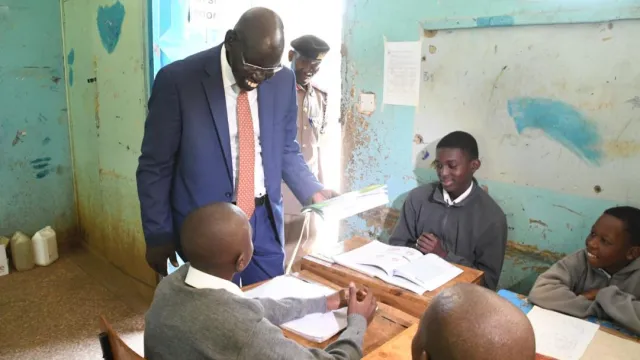Public schools buckle under congestion crisis

Basic Education PS Dr. Belio Kipsang visits various schools in Nairobi and Kiambu counties during the opening day of the first term 2025.
Thousands of learners in Kenya will only access classrooms during their peers' health breaks due to a biting shortage of learning space in public schools as the 2025 academic year starts.
According to Basic Education Principal Secretary Dr. Belio Kipsang, heads of the affected schools will be forced to improvise solutions to manage the looming classroom crisis as the country welcomes the first Grade 9 cohort under the Competency Based Curriculum.
"In situations where congestion becomes unmanageable, we may have to adopt a multi-shift system, where one group uses classrooms while another engages in outdoor activities," Dr. Kipsang said on Monday, signaling the weighty nature of the problem as the first term begins.
He added that congestion in public schools is likely to continue for at least a month as his Ministry secures enough resources to build enough classrooms in schools.
Currently, out of the required 16,000 Grade 9 classrooms across Kenya, only 13,500 have been set up—10500 by the Ministry of Education while 3,000 have been financed under the Constituency Development Fund (NG-CDF).
In an update on the first day of school re-opening, Dr. Kipsang revealed that the government plans to construct an additional 11,000 classrooms at an estimated cost of KES16 billion.
Recently, the Auditor-General Nancy Gathungu put the Education ministry officials on the spot for failing to account for KES6.7 billion spent on classroom projects in primary and secondary schools.
“Full value for money may not have been realised from expenditure on the construction contracts valued at Ksh 6,655,812,555,” said the Auditor-General.
Gathungu, in a review of the World Bank-funded projects, questioned a spending of KES60 million on consultants supervising the works in the Secondary Education Quality Improvement Project.
This was because field visits in Laikipia, Baringo and Homa Bay established that the consultant did not have clerks of works at the project sites.
Meanwhile, a total of 9.9 million books have been distributed to different primary schools targeting thousands of Grade 9 learners across the country.




